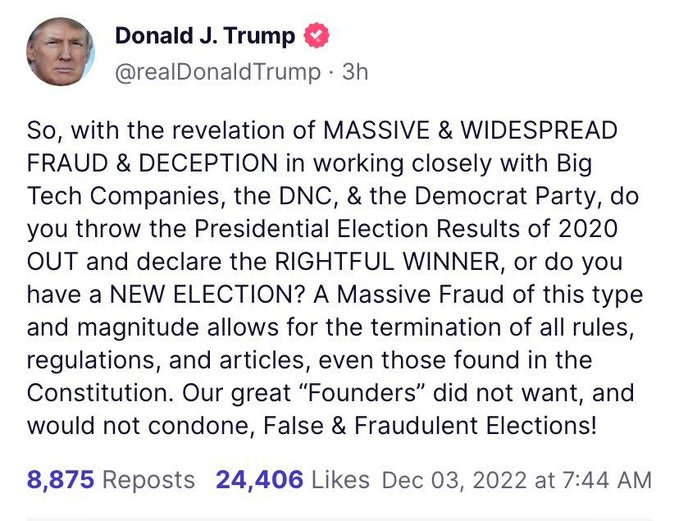Trump and the Dictator’s Playbook
Donald Trump has restored to a historic strategy from the dictator's playbook
Over the course of the twentieth century, would be dictators who have sought to undermine and overthrow liberal democratic regimes have followed a few identifiable and oft repeated patterns. We can call this the dictator’s playbook. In an already infamous social media post yesterday, former President Donald Trump advocated for the “termination of all rules, regulations, and articles, even those found in the Constitution.” The disgraced former president repeats his falsehoods about the 2020 election and demands that he be returned to power. His appeal is nothing less than a mortal threat against life of the U.S Constitution and American democracy. Furthermore, it is nothing new, instead his latest assault on the core values of Americanism is a tried and true tactic from the dictator’s playbook. Specifically, the would be dictator ensures those around them that the current political environment has become too dangerous for democracy. This is always the case because democracy is somehow being manipulated by some nefarious force that can only be defeated by granting the would be dictator the absolute power they desire and abandoning democracy and any constraints on executive power.
The History Behind the Strategy
The rise of fascism and its adherents give us the most clear and notorious use of this tactic. The father of fascism, the Italian dictator Benito Mussolini, laying out the “doctrine” of his ideology in 1932 stated:
Democratic regimes may be described as those under which the people are, from time to time, deluded into the belief that they exercise sovereignty, while all the time real sovereignty resides in and is exercised by other and sometimes irresponsible and secret forces.
Here we see the outline for this particular page of the dictator’s playbook. The need to identify some “secret” force that is “deluding” people and rigging elections. Once this has been established the would be dictator then presents themself as the solution. Put he or she in power and allow them to govern without constraints on their authority and they will enact the “will of the people.” As oft discussed in our pieces, this is in and of itself a fallacy. No single “will of the people” exists, instead there is an innumerable set of varying wills in competition which is the point of a democratic representative system in the first place.
A year after Mussolini’s speech, Adolf Hitler put this strategy into effect in Germany. Before ascending to the dictatorial position of Führer, Hitler served as chancellor within Germany’s interwar democratic system. During his time as chancellor, the parliament building known as the Reichstag burned down as the result of arson. While the real story behind the arson remains a matter of debate, at the time Hitler and Nazi leadership accused their political opposition, specifically communists, of having started the fire. Without evidence they concocted a narrative that the German democratic system had been infiltrated by groups opposed to what was truly best for Germany. Hitler secured emergency powers that overrode the constitution and put him on the path to becoming Germany’s dictator. In his appeal for these powers, he argued:
The Government of the National Revolution basically regards it as its duty, in accordance with the spirit of the people’s vote of confidence, to prevent the elements which consciously and intentionally negate the life of the nation from exercising influence on its formation. The theoretical concept of equality before the law shall not be used, under the guise of equality, to tolerate those who despise the laws as a matter of principle or, moreover, to surrender the freedom of the nation to them on the basis of democratic doctrines.
True to Mussolini’s prescription, Hitler had identified secret forces threatening the nation, communists and Jews, and was now asserting that democracy was enabling these malicious forces. He insisted that the constitution be violated, and emergency powers granted to him to stop said forces. Hitler’s success allowed for the innumerable atrocities committed by the Nazi state.
Less well known generally is the case of Brazil with which this author is intimately familiar having studied it in great detail as part of his doctoral dissertation. In 1937, Brazil’s president Getúlio Vargas managed to create his own quasi-fascist dictatorship, throwing off the democratic regime that preceded it. Vargas too used a fictitious communist plot to induce a state of fear in his country and voided the Brazilian constitution. In justifying his authoritarian takeover, Vargas told the Brazilian people that in the time of crisis they were experiencing (a crisis partially of his own making) democracy was insufficient. Democracy in these moments, he said, “subverts the hierarchy, threatens the unity of the country and endangers the existence of the Nation.”
The Oath
The institutions, politicians, and peoples of pre-war Italy, Germany, and Brazil failed to respond sufficiently to reject the siren song of dictatorship. The United States must not make the same mistake. Members of both houses of Congress swear an oath upon taking office which holds:
I do solemnly swear (or affirm) that I will support and defend the Constitution of the United States against all enemies, foreign and domestic; that I will bear true faith and allegiance to the same.
Having sworn such an oath, it is incumbent upon every member of Congress to reject Trump’s brazen attack on the Constitution and the man himself. Failure to do so would leave any elected official in violation of his oath and dereliction of his duty. Former President Trump has resorted to a classic strategy from the dictator’s playbook, it must not be allowed to work.




